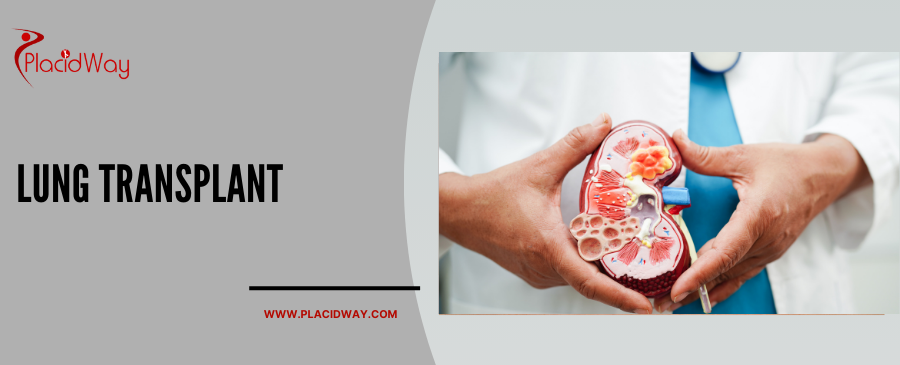
Breathing New Life: Exploring Lung Transplant Options Globally
Living with a severe lung condition can feel like an unending struggle, where every breath is a conscious effort. For millions worldwide, conditions like chronic obstructive pulmonary disease (COPD), idiopathic pulmonary fibrosis (IPF), or cystic fibrosis eventually progress to a stage where conventional treatments are no longer enough. This is where a lung transplant, often considered the ultimate treatment for end-stage lung disease, enters the conversation. It's a procedure that offers not just an improvement in symptoms, but a genuine chance at a longer, fuller life.
When you hear "lung transplant," you might immediately think of a complex, high-stakes surgery. And it is. But for those facing severe breathing difficulties, constant fatigue, and a diminished quality of life, it represents hope. Patients often search online for "what is a lung transplant," "who needs a lung transplant," or "can I get a lung transplant abroad," reflecting a deep desire for solutions when local options seem limited or out of reach. This comprehensive guide aims to address these critical questions, exploring the procedure, its eligibility, recovery, and importantly, the growing landscape of medical tourism that makes life-saving lung transplants accessible to more people globally.
The journey to a lung transplant is significant, involving extensive evaluation and a commitment to lifelong care. However, for those with conditions causing progressive respiratory failure, a successful transplant can dramatically improve lung function, alleviate debilitating symptoms, and restore the ability to live actively. Understanding the full scope of this treatment, from the underlying causes of lung failure to the realities of recovery and global cost variations, is the first step towards making an informed decision about this transformative procedure.
What are the symptoms indicating a need for a lung transplant?
Recognizing the signs that your lung condition is severely impacting your life is crucial. Many patients search for "signs of end-stage lung disease" or "when is a lung transplant necessary." These symptoms typically worsen over time and significantly impair daily activities:
- Severe Shortness of Breath (Dyspnea): This is the most prominent symptom. Initially, it might occur only during exertion, but as the disease progresses, breathlessness can happen even at rest or with minimal effort like walking across a room or dressing.
- Chronic Cough: A persistent, often debilitating cough, sometimes producing mucus or phlegm, is common in conditions like cystic fibrosis or COPD.
- Persistent Fatigue and Weakness: Your body works incredibly hard to breathe, leading to overwhelming tiredness that isn't relieved by rest.
- Unexplained Weight Loss: The increased energy expenditure from struggling to breathe can lead to muscle wasting and significant weight loss.
- Cyanosis or Clubbing: A bluish tint to the lips or fingertips (cyanosis) indicates low oxygen levels, while clubbing refers to the enlargement of the fingertips and curving of the nails.
- Frequent Respiratory Infections: Recurrent bronchitis, pneumonia, or other lung infections are common as lung function declines.
- Swelling in Ankles, Feet, or Abdomen: This can indicate heart strain due to pulmonary hypertension, a common complication of severe lung disease.
- Limited Quality of Life: Inability to participate in hobbies, work, or social activities due to breathing difficulties.
What causes end-stage lung disease requiring a transplant?
A lung transplant becomes an option when various lung diseases advance to a point where they are irreversible and life-threatening. Patients often search for "causes of lung failure" or "diseases treated by lung transplant." The most common culprits include:
- Chronic Obstructive Pulmonary Disease (COPD) and Emphysema: Long-term exposure to irritants (primarily cigarette smoke) damages the air sacs (alveoli) and airways, leading to airflow obstruction.
- Idiopathic Pulmonary Fibrosis (IPF): A progressive disease characterized by scarring (fibrosis) in the lungs, making them stiff and difficult to breathe. The "idiopathic" means the cause is unknown.
- Cystic Fibrosis (CF): A genetic disorder that causes thick, sticky mucus to build up in the lungs, leading to severe infections and permanent damage.
- Pulmonary Hypertension: High blood pressure in the arteries leading to the lungs, which can eventually lead to heart and lung failure.
- Alpha-1 Antitrypsin Deficiency: A genetic condition that predisposes individuals to early-onset emphysema.
- Bronchiolitis Obliterans: A rare, severe form of obstructive lung disease where the smallest airways become scarred and narrowed, often seen after lung infections or organ transplantation.
- Sarcoidosis: An inflammatory disease that can affect various organs, including the lungs, causing granulomas (clumps of inflammatory cells) to form.
What types of lung transplants are available?
The type of lung transplant recommended depends on the specific lung disease and the patient's overall health. When people search for "single vs. double lung transplant" or "types of lung surgery," they are often trying to understand these distinctions:
- Single Lung Transplant: Involves replacing one diseased lung with a healthy donor lung. This is often an option for conditions like pulmonary fibrosis or COPD, especially in older patients or those with other significant health issues that make a double transplant too risky.
- Double Lung Transplant (Bilateral Lung Transplant): Replaces both diseased lungs with two healthy donor lungs. This is typically preferred for conditions like cystic fibrosis, bronchiectasis, or severe emphysema, where both lungs are extensively damaged or there's a high risk of infection spreading from the remaining diseased lung. It generally offers better long-term outcomes and lung function.
- Heart-Lung Transplant: In very rare cases, both the heart and lungs are replaced simultaneously. This is reserved for patients with combined end-stage heart and lung disease that cannot be treated individually.
Who is eligible for a lung transplant? (And who isn't?)
Not everyone with end-stage lung disease is a candidate for a transplant. The evaluation process is rigorous, aiming to identify patients who will most likely benefit and thrive post-transplant. Patients often ask, "what are lung transplant criteria?" or "who can get a lung transplant?"
Eligibility Criteria Generally Include:
- End-Stage Lung Disease: A diagnosis of severe, irreversible lung disease with a high risk of death within 1-2 years without transplant, and no other effective medical or surgical treatments.
- Age: While there's no strict age cut-off, candidates generally need to be physically fit enough to withstand the surgery and recovery. Most programs consider patients up to age 65-70.
- Relatively Good Health: No other major organ system failures (e.g., severe kidney, liver, or heart disease), no active infections, and no history of cancer (or a long enough cancer-free period).
- Nutritional Status: Maintaining a healthy body weight; being severely underweight or obese can complicate surgery and recovery.
- Psychological Stability and Support: A strong support system, mental resilience, and the ability to adhere to a complex, lifelong medication and follow-up regimen.
- No Substance Abuse: No active smoking, alcohol, or illicit drug abuse.
Conditions That Might Rule Out a Transplant:
- Active or recent cancer
- Untreatable severe heart, kidney, or liver disease
- Active systemic infection (e.g., HIV with active disease, Hepatitis B/C without control)
- Significant obesity or malnutrition that cannot be corrected
- Inability to comply with complex medical regimens
- Lack of a strong support system
What is the typical recovery time and what can I expect post-procedure?
Recovery from a lung transplant is a marathon, not a sprint. Patients often search for "lung transplant recovery timeline" or "life after lung transplant." While individual experiences vary, here's a general overview:
- Immediate Post-Op (Hospital Stay): You'll likely spend several days in the Intensive Care Unit (ICU), followed by weeks in a regular hospital ward. During this time, you'll have tubes for breathing, drainage, and medication. Physical therapy starts almost immediately to prevent muscle deconditioning.
- Rehabilitation (First 3-6 Months): After discharge, you'll enter an intensive outpatient rehabilitation program. This includes breathing exercises, physical activity to regain strength, and education on medication management and self-care. It's a critical phase for improving lung function and overall fitness.
- Medication Adherence: Lifelong immunosuppressant medications are essential to prevent your body from rejecting the new lung(s). These must be taken precisely as prescribed. You'll also be on other medications to prevent infections and manage side effects.
- Return to Normal Activities: Most patients can gradually return to light activities within 3-6 months and more significant activities (including work, if applicable) within 6-12 months. Full recovery can take a year or more.
- Lifelong Follow-up: Regular check-ups, lung function tests, and sometimes biopsies are necessary to monitor for rejection and complications.
It's important to remember that a lung transplant means committing to a new lifestyle of vigilant health management. However, the reward is often a dramatic improvement in breathing and a renewed sense of energy and well-being.
What are the risks and potential side effects of a lung transplant?
Like any major surgery, especially organ transplantation, a lung transplant carries significant risks. Patients often search for "lung transplant complications" or "immunosuppressant side effects." Being aware of these helps in preparation and post-operative vigilance:
- Organ Rejection: The most significant risk. Your immune system may recognize the new lung as foreign and try to attack it. Acute rejection is common and treatable, but chronic rejection (bronchiolitis obliterans syndrome - BOS) can severely damage the airways and is a major cause of long-term transplant failure.
- Infection: Immunosuppressant medications weaken your immune system, making you highly susceptible to bacterial, viral, and fungal infections, which can be life-threatening.
- Surgical Complications:
- Bleeding
- Blood clots
- Airway or vascular problems at the connection sites
- Pneumothorax (collapsed lung)
- Pain
- Side Effects of Immunosuppressant Medications: These medications are vital but can cause various side effects, including:
- Kidney dysfunction or failure
- High blood pressure (hypertension)
- Diabetes
- Osteoporosis (bone thinning)
- Increased risk of certain cancers (e.g., skin cancer, post-transplant lymphoproliferative disorder - PTLD)
- High cholesterol
- Weight gain, tremors, stomach upset
- Primary Graft Dysfunction (PGD): A severe form of acute lung injury that can occur within the first 72 hours post-transplant, where the new lungs don't function properly.
Despite these risks, medical advancements continue to improve outcomes, and careful monitoring helps manage potential complications.
How do lung transplant costs compare worldwide?
The cost of a lung transplant is a significant factor for many patients, often leading them to search for "lung transplant cost USA vs India" or "affordable lung transplant abroad." The procedure is incredibly complex and involves not just the surgery but extensive pre-operative evaluation, post-operative care, rehabilitation, and lifelong medications. These costs can vary wildly depending on the country, healthcare system, and specific clinic.
Here's an illustrative cost comparison (these are approximate and can fluctuate):
| Country | Estimated Cost (USD) | Notes |
|---|---|---|
| United States | $1,000,000 - $1,500,000+ | Often includes pre/post-op care, but long waiting lists and complex insurance. |
| United Kingdom | £100,000 - £250,000+ ($120,000 - $300,000+) | Mostly covered by NHS for residents; private options are expensive. |
| India | $100,000 - $180,000 | Highly competitive prices, advanced facilities, English-speaking staff. |
| Turkey | $120,000 - $200,000 | Modern hospitals, experienced surgeons, growing medical tourism destination. |
| Thailand | $150,000 - $250,000 | Renowned for patient hospitality, excellent facilities, and quality care. |
| Spain / Germany (Private) | $200,000 - $400,000+ | High-quality care, but often requires significant out-of-pocket payment for non-residents. |
These figures typically include the surgery itself, hospital stay, pre-op assessments, and initial post-op care. However, they usually do not include travel, accommodation for accompanying family members, or long-term immunosuppressant medications, which are a recurring cost regardless of where the transplant is performed. The vast difference in cost is a primary driver for medical tourism.
Why consider a lung transplant abroad? (Medical Tourism Focus)
For many individuals and families, the decision to seek a lung transplant abroad stems from a combination of factors, often driven by necessity. Patients often search for "benefits of medical tourism for lung transplant" or "why go overseas for transplant."
- Cost Savings: As seen in the table above, the most compelling reason is often the substantial cost reduction compared to Western countries like the USA or UK (for private patients). This makes a life-saving procedure financially viable for those without comprehensive insurance or facing prohibitive out-of-pocket expenses.
- Reduced Waiting Times: In some countries, particularly where deceased donor programs are less stressed or where living-donor options exist for specific scenarios (though less common for lung transplants than kidney/liver), waiting lists can be shorter. This can be critical for patients whose condition is rapidly deteriorating.
- Access to Specialized Care: Certain countries or institutions might specialize in particular aspects of lung transplantation, offering unique expertise or technologies not readily available elsewhere.
- Privacy and Anonymity: For some, traveling abroad offers a level of privacy and discretion that might be appealing during a sensitive medical journey.
- Comprehensive Packages: Many international hospitals and medical tourism facilitators offer all-inclusive packages that cover travel, accommodation, translation services, and post-operative care, streamlining the process.
Which countries offer the best value for lung transplants?
When seeking high-quality, affordable lung transplant options, certain countries have emerged as leaders in medical tourism. Patients often search for "best countries for lung transplant abroad" or "top hospitals for lung transplant in Asia."
- India: Renowned for its world-class hospitals, highly experienced English-speaking medical professionals, and significantly lower costs. Cities like Chennai, Delhi, and Hyderabad have advanced transplant centers with strong success rates.
- Turkey: A rapidly growing medical tourism hub, Turkey boasts modern, internationally accredited hospitals with state-of-the-art technology and skilled surgeons, particularly in cities like Istanbul and Ankara, offering competitive pricing.
- Thailand: Known for its exceptional patient care, luxurious facilities, and experienced medical staff, Thailand (especially Bangkok) offers a compelling combination of quality, service, and affordability for complex procedures.
- Spain/Germany (for European patients): While often more expensive than Asian options, these European countries offer high-quality care, advanced research, and sometimes shorter waiting lists for those within the EU, with robust regulatory frameworks.
The "best value" often combines cost-effectiveness with a track record of successful outcomes, patient safety, and comprehensive post-operative support.
What should I expect when traveling for a lung transplant abroad?
Embarking on a medical journey abroad requires careful planning. Patients often look for "medical tourism checklist for lung transplant" or "traveling for major surgery abroad."
- Initial Consultation & Evaluation: This often starts remotely with sharing medical records. Many centers require an on-site, in-person evaluation to confirm eligibility and ensure you're placed on their waiting list.
- Travel Logistics: Planning flights, securing necessary visas (medical visas might be available), and arranging long-term accommodation for you and your accompanying family member(s) for potentially several months.
- Accommodation: You'll need accommodation not just for the hospital stay but also for the pre-transplant evaluation period and the initial rehabilitation phase after discharge.
- Cultural & Language Considerations: While many medical staff in leading medical tourism destinations speak English, familiarize yourself with basic phrases or utilize translation services if needed. Be open to cultural differences.
- Financial Planning: Beyond the procedure cost, budget for travel, extended stays, food, local transport, and potential unexpected expenses.
- Support System: Having a family member or close friend accompany you is crucial for emotional support, practical assistance, and understanding medical instructions.
- Communication with Home Doctors: Maintain open communication with your local healthcare team to ensure a smooth transition of care upon your return.
How can I ensure safety and quality when seeking a lung transplant abroad?
Safety and quality are paramount. Don't compromise. Patients often search for "safe lung transplant abroad" or "how to choose a foreign hospital for transplant."
- Accreditation: Look for international accreditations like Joint Commission International (JCI), which signifies adherence to global patient safety and quality standards.
- Surgeon & Team Credentials: Verify the experience and qualifications of the transplant surgeons and their team. How many lung transplants do they perform annually? What are their success rates?
- Facility Standards: Ensure the hospital has state-of-the-art operating rooms, an advanced ICU, and comprehensive post-operative support services, including rehabilitation.
- Donor Organ Procurement: Understand the ethical and legal frameworks for deceased donor organ allocation in the host country.
- Comprehensive Care Plan: Ensure the package includes pre-operative evaluation, the surgery, hospital stay, initial rehabilitation, and a clear plan for follow-up care once you return home.
- Medical Tourism Facilitators: Reputable facilitators like PlacidWay can help vet clinics, arrange logistics, and provide transparent information, acting as a crucial intermediary.
- Patient Testimonials & Reviews: Look for genuine reviews and testimonials from other international patients who have undergone similar procedures.
What are patient success stories from abroad?
The stories of patients who have successfully undergone lung transplants abroad are testaments to the power of medical tourism. These are individuals who, like you, faced dire prognoses and limited options in their home countries, but found a second chance at life through international care.
- The Father from the UK: Facing a long waiting list and the grim reality of rapidly deteriorating COPD, he traveled to India. After a successful double lung transplant, he returned home months later, able to play with his grandchildren and enjoy walks he thought were impossible.
- The Young Woman with Cystic Fibrosis from the US: Unable to afford the astronomical costs in her home country, she and her family explored options in Turkey. She underwent a successful bilateral lung transplant and now advocates for global access to life-saving procedures, enjoying a vastly improved quality of life.
- The Business Executive from Canada: Frustrated by delays in his local healthcare system for his idiopathic pulmonary fibrosis, he opted for a leading transplant center in Thailand. His recovery was remarkable, allowing him to return to a modified work schedule and enjoy travel once again.
These stories highlight that while the journey is challenging, the outcome can be profoundly life-changing. Medical tourism offers a viable, often more accessible, path to these life-saving procedures, providing hope where it once seemed scarce.
Take the Next Step with PlacidWay
Ready to explore treatment options abroad? Discover top clinics, compare prices, and get a free quote tailored to your needs with PlacidWay.
Best Organ Transplant Center | Cheap Organ Transplant Packages





.png)

.png)
.png)

Share this listing